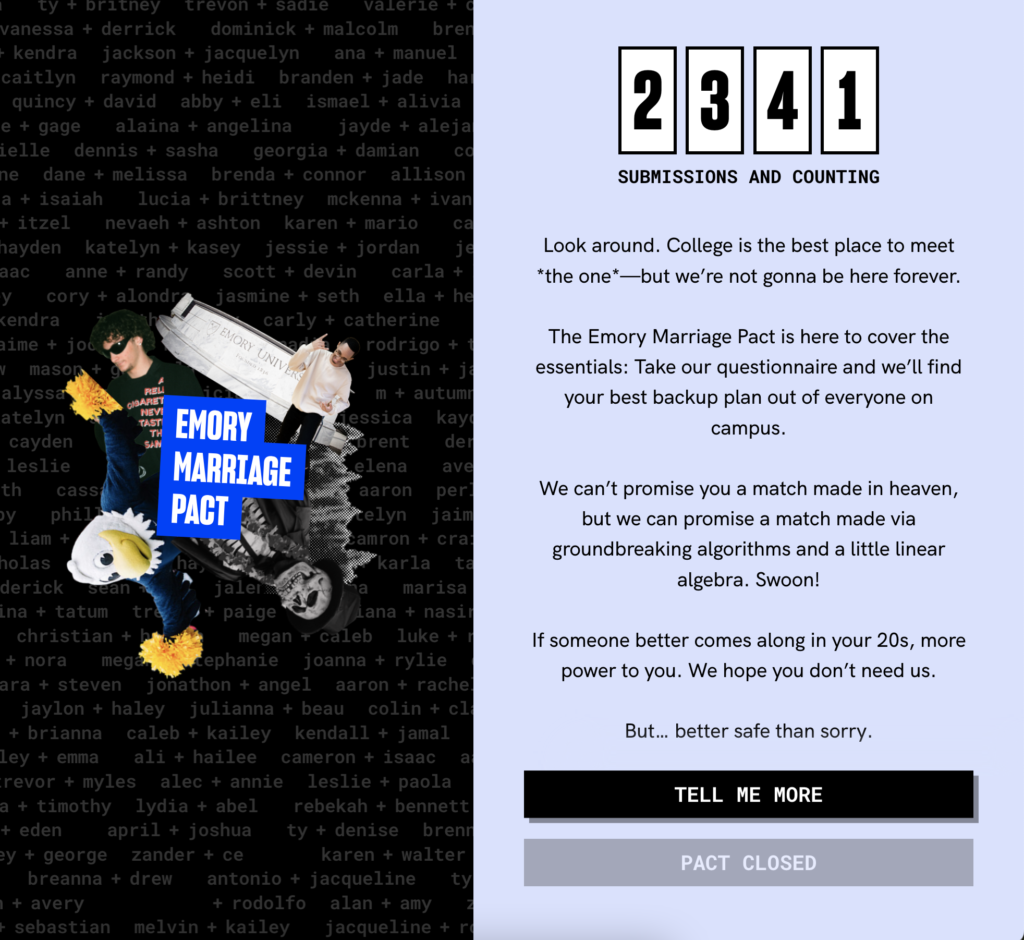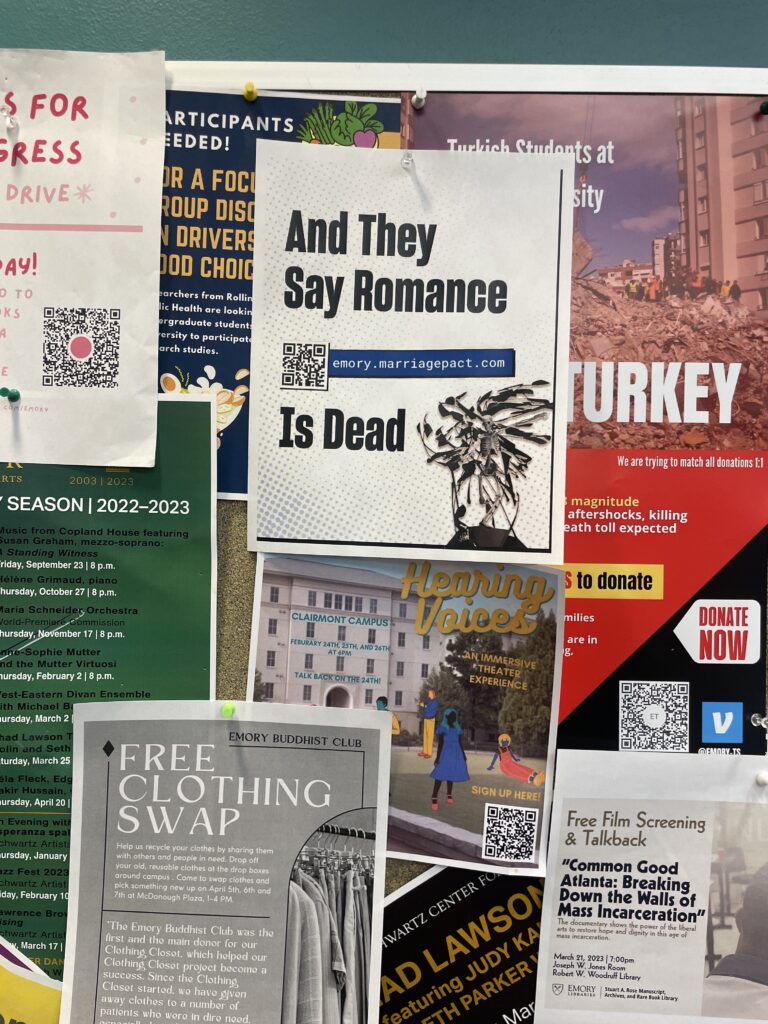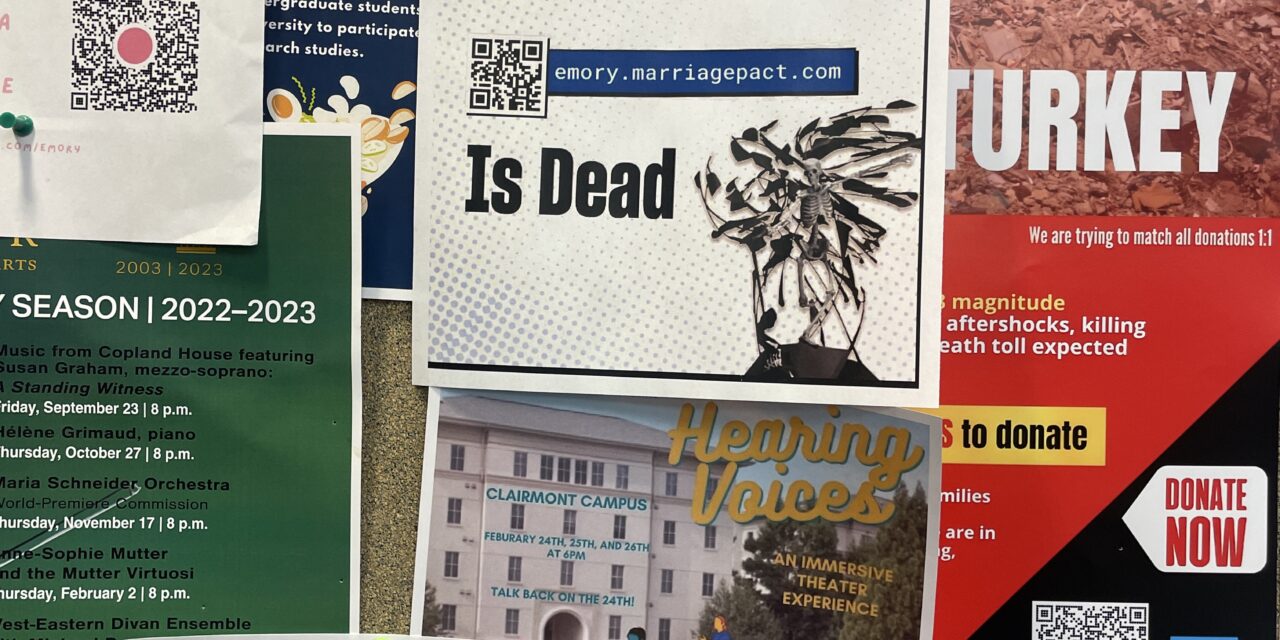On Monday evening, 2,341 Emory University students received an email at the same time. Maybe they filled out the Marriage Pact survey on a dare; maybe they were hoping to meet their one true love. Either way, their name and email were in another student’s Outlook inbox on March 20 with a touch of funky pop-art.
Marriage Pact arrived at Emory this spring, all the way from the sunny West Coast. Founded in 2017 by Stanford University (Calif.) students Liam McGregor and Sophia Sterling-Angus, the website promises to find users the “most compatible marital backup plan on [their] campus, down to the percent.” While Marriage Pact’s methodology remains mysterious — it involves “groundbreaking algorithms and a little linear algebra” — college students at 78 campuses nationwide have made taking the matchmaking survey an annual tradition.

(Emory Wheel / Oli Turner)
Marriage Pact’s website advertises an open call to bring the pact to more schools, and this year, that’s what Emory Marriage Pact ambassadors Sam Bochner (23C), Nirvan Panjwani (26C) and Andrew Tokar (23C) did.
After four years at Emory, Bochner has observed a sense of division between the diverse communities in the student body.
“I’ve had a really beautiful time at Emory and being involved in a bunch of different communities, but I think it takes effort,” Bochner said. “It’s easy to fall into groups and stay complacent in them, and you kind of have to push yourselves to grow out of those.”
The survey, which was open for submissions for a single week, asks participants to rank the extent to which they agree with 50 prompts on a seven-point scale. Lifestyle, priorities and personality factor into the questionnaire. At the end of the survey, participants have an opportunity to enter the email of a crush or a friend, and Marriage Pact will anonymously notify them about a “secret admirer” and encourage them to take the survey. It’s all about engagement — no pun intended.
This past week, news about Marriage Pact spread quickly by word-of-mouth and through Fizz, a social-networking app for college communities. By the time the survey closed, over 30% of the undergraduate population had filled it out.
A large pool of potential suitors may seem promising, but for Jessica He (25C), the algorithm seemed to be playing a cruel joke. He had initially filled it out with their friends, bonding over the survey questions at lunch with no expectations — they only hoped that they would match with someone new.
“From what I’ve seen … everyone went into it as a joke or something fun to do,” He said. “It was never really that serious.”
Two hours before Marriage Pact released the full names of matches, participants received the first and last initials of their match’s name, prompting a guessing game for many students.
That’s when He had an inkling about their match. They hoped it wasn’t true, but at 8:30 p.m., there it was: they had matched with their ex.
“God hates me,” He laughed.
An unfortunate coincidence, but, as Marriage Pact reminds its users, “an algorithm is not the hand of God.”
Alex Panos (26C) took the survey quickly, often answering with “3” or “4” on the questionnaire’s rating system so as “not to take it seriously.”
Like He, Panos’ match was awkward: someone he had a history with. Panos said many of his friends also matched with people they knew, but others matched with strangers. All laughed it off and echoed that common refrain; it’s not that serious.
If nothing else, Marriage Pact proved students could relax a little.
Noah Lian (23Ox) filled out the survey on the final day after seeing that 2,000 students had already signed up. Lian and his friends already use Checkmate, an app from the Marriage Pact creators that uses a similar survey to test users’ friendship compatibility.
“It’s just something to laugh about and talk about,” Lian said. “Especially with the time where midterms [are] happening, and everyone’s stressed about tests and assignments and homework, it’s nice to take a break once and a while and just unwind.”
Lian was surprised to match with a close friend and fellow Oxford student, since he assumed fewer Oxford students filled out the survey than Atlanta students.
“I had a lot of fun talking to a lot of my friends about our statistics and everything,” Lian said. “It’s something to … distract ourselves from school for just a little bit.”
Lian said he hopes Marriage Pact returns to campus in future years.
“It’s fun to connect with the rest of the community and have something that we can all talk about,” Lian said.

(Emory Wheel / Oli Turner)
Despite the “secret admirer” feature, a “lopsided” matching pool delayed the release of the app’s algorithm-fated “matches.” According to a March 19 email from Marriage Pact to match-seekers, 442 more straight women filled out the survey than straight or bisexual men. The email extended the survey deadline until 3 p.m. the next day and urged participants to encourage their male friends to sign up, but many females still ended up on a matching waitlist.
Emily Choi (25C) was one of the hundreds of straight female participants left without a male match.
An email provided her an “optimal *friend* match” instead. Choi’s potential platonic buddy was “the best you should talk to among all the waitlisted peeps,” the message read.
Choi was initially a bit disappointed, but ultimately, she and her friends saw humor in the experience. After all, the Marriage Pact gender imbalance reflects the University’s actual undergraduate gender distribution: 42% male, 58% female.
“I didn’t really have high hopes for this survey anyways,” Choi said. “I kind of did it for fun.”
Choi doesn’t plan to reach out to her match, whose social media she could not find.
“Overall, I thought this was really cool and entertaining, especially when we got the initials and before the actual name was released,” Choi said. “There was this tension and then we were trying to guess the initial, and that part was the most fun.”
Tokar said Marriage Pact can bring students together by breaking down social barriers at Emory, which Tokar believes lacks school spirit.
“Things like this kind of make the school a better, warmer, more positive place,” Tokar said.
Panjwani said that while the pact is branded with an air of romanticism — “marriage” is in the name, after all — students should be open to a platonic match.
“We get a lot of questions that are like, ‘I’m in a relationship. Should I still fill this out?’” Panjwani said. “I think yes. It is a backup plan.”
The ambassadors are trying to establish a tradition of excitement through Marriage Pact and a concerted effort to search for meaningful relationships among people with different interests and backgrounds, Bochner said.
Bochner said Marriage Pact can make students curious about the commonalities or differences that may exist between the people around them that create “a sense of mystery.”
“Marriage Pact is going to come and go, but if people have a sense that there may be people across campus that they share things in common with, I think that will be a good outcome,” Bochner said.
Oli Turner (she/her) is from Manchester, Massachusetts, majoring in English & Creative Writing and minoring in Rhetoric, Writing, & Information Design. Her work has appeared in Atlanta Magazine, Boston Hassle, and the Manchester Cricket. She co-hosts the Wheel's arts & entertainment podcast, Clifton Culture, which spotlights student artists at Emory. Outside of the Wheel, she serves as Vice President of WMRE, Emory's student-run radio station. When she's not writing, editing, or DJ-ing, you can find her at the nearest DIY show scoping out local live music.



